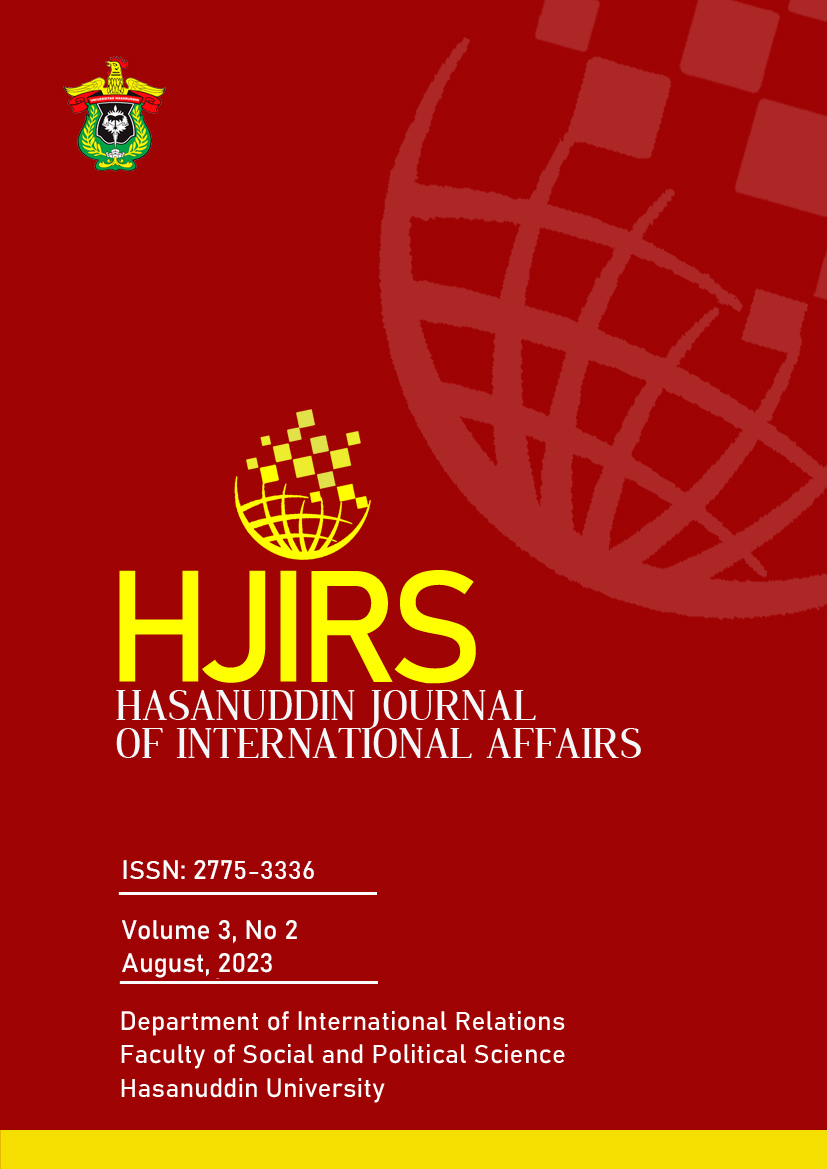Main Article Content
Abstract
The Syrian conflict involving government troops and opposition groups that has occurred since 2011 has resulted in a severe humanitarian crisis. Although this conflict has been mediated by various parties, until now the problem has not been resolved. This article will discuss one of the international actors who participated in dealing with the humanitarian impact that occurred in Syria, namely Medecins Sans Frontieres (MSF). The role of MSF will be analysed using the concept of humanitarian principles in global humanitarian action. Data was collected through an online literature search relevant to this study. This article finds that MSF has a major role to play in helping to ease the health burden experienced by the war-affected Syrian people. In its role too, MSF always adheres to humanitarian principles such as humanity, neutrality, independence and impartiality.
Konflik Suriah yang melibatkan tantara pemerintah dan kelompok opoisis yang terjadi sejak tahun 2011 menghasilkan krisis kemanusiaan yang parah. Meskipun konflik ini telah berupaya dimediasi oleh berbagai pihak, namun sampai saat ini permasalah tersebut belum juga tuntas. Artikel ini akan membahas salah satu aktor internasional yang turut serta dalam menangani dampak kemanusiaan yang terjadi di Suriah yaitu Medecins Sans Frontieres (MSF). Peran MSF ini akan dianalisis dengan menggunakan konsep prinsip kemanusiaan dalam aksi kemanusiaan global (humanitarian action). Data dikumpulkan melalui penelusuran literatur daring yang relevan dengan kajian ini. Artikel ini menemukan bahwa MSF memiliki peran besar dalam membantu meringantkan beban Kesehatan yang dialami oleh masyarakat Suriah yang terdampak perang. Dalam perannya juga, MSF selalu menjalankan prinsip – prinsip kemanusiaan seperti kemanusiaan, netralitas, kemandirian dan ketidakberpihakan.
Keywords
Article Details
References
- Akbarzadeh, Shahram, and Arif Saba. 2018. “UN paralysis over Syria: the responsibility to protect or regime change?” International Politics 1 (1): 1-14.
- Ardilla, Nina. 2018. “Intervensi Kemanusiaan International Committee Of The Red Cross (Icrc) Terhadap Korban Konflik di Suriah.” eJournal Ilmu Hubungan Internasional 6 (2): 403-416.
- Goldfarb, Michael. 2013. “Iraq: Growing number of Syrian refugees in Domeez.” MSF. https://www.msf.org/iraq-growing-number-syrian-refugees-domeez.
- Hasanah, Yorry. 2015. “Peran MSF (Medecins Sans Frontieres) dalam Menangani Epidemi Ebola di Afrika Barat tahun 2012-2014.” Jom FISIP 2, no. 2 (october): 1-13.
- Hilhorst, Dorothe, and Nadja Schmiemann. 2002. “Humanitarian principles and organisational culture: everyday practice in Medecins Sans Frontieres-Holland.” Development in Practice 12 (3).
- “Humanitarian principles | NRC.” n.d. Norwegian Refugee Council (NRC). Accessed May 19, 2023. https://www.nrc.no/what-we-do/speaking-up-for-rights/humanitarian-access/.
- Labbe, Jeremie, and Pascal Daudin. 2016. “Applying the humanitarian principles: Reflecting on the experience of the International Committee of the Red Cross.” International Review of the Red Cross 97 (897/898): 183-210. 10.1017/S1816383115000715.
- Mackintosh, Kate. 2000. “The Principles of Humanitarian Action in International Humanitarian Law.” Overseas Development Institute.
- Malhuret, Claude, and Rony Brauman. n.d. “Who we are.” MSF. Accessed November 5, 2022. https://www.msf.org/who-we-are.
- Pratiwi, Efissa, and Idjang Tjarsono. 2017. “Peran International Committee of the Red Cross (ICRC) dalam Menangani Krisis Kemanusiaan di Suriah tahun 2012-2015.” Jurnal Online Mahasiswa (JOM) 4 (2): 1-13.
- Release, Press. 2014. “Hundreds of wounded in Syria after crowded market is bombed in besieged Damascus suburb.” MSF. https://www.msf.org/hundreds-wounded-syria-after-crowded-market-bombed-besieged-damascus-suburb.
- Surinyach, Anna. 2013. “Syria: Measles epidemic signals growing humanitarian needs.” MSF. https://www.msf.org/syria-measles-epidemic-signals-growing-humanitarian-needs.
- The Field, Voices f. 2012. “Lebanon: Caring for the most vulnerable.” MSF. https://www.msf.org/lebanon-caring-most-vulnerable.
- The Field, Voices f. 2012. “Syria: 'In addition to many civilians, we treated both wounded rebel fighters and soldiers from the Syrian army.'” MSF. https://www.msf.org/syria-addition-many-civilians-we-treated-both-wounded-rebel-fighters-and-soldiers-syrian-army.
- Trelles, Miguel, Lynette Dominguez, Katie T. Smith, Katrin Kisswani, Alberto Zerboni, Theirry Vandernborre, Silvia Dallatomasina, Alaa Ragmoun, and Marie C. Fetire. 2015. “Providing surgery in a war-torn context: the Médecins Sans Frontières experience in Syria.” Conflict and Health 9 (1): 1-8.
- Update, Project. 2021. “A decade of war in Syria: 10 years of increasing humanitarian needs.” MSF. https://www.msf.org/decade-war-syria.
- Véran, Jean-François, ed. 2020. Médecins Sans Frontières and Humanitarian Situations: An Anthropological Exploration. N.p.: Taylor & Francis Group.
References
Akbarzadeh, Shahram, and Arif Saba. 2018. “UN paralysis over Syria: the responsibility to protect or regime change?” International Politics 1 (1): 1-14.
Ardilla, Nina. 2018. “Intervensi Kemanusiaan International Committee Of The Red Cross (Icrc) Terhadap Korban Konflik di Suriah.” eJournal Ilmu Hubungan Internasional 6 (2): 403-416.
Goldfarb, Michael. 2013. “Iraq: Growing number of Syrian refugees in Domeez.” MSF. https://www.msf.org/iraq-growing-number-syrian-refugees-domeez.
Hasanah, Yorry. 2015. “Peran MSF (Medecins Sans Frontieres) dalam Menangani Epidemi Ebola di Afrika Barat tahun 2012-2014.” Jom FISIP 2, no. 2 (october): 1-13.
Hilhorst, Dorothe, and Nadja Schmiemann. 2002. “Humanitarian principles and organisational culture: everyday practice in Medecins Sans Frontieres-Holland.” Development in Practice 12 (3).
“Humanitarian principles | NRC.” n.d. Norwegian Refugee Council (NRC). Accessed May 19, 2023. https://www.nrc.no/what-we-do/speaking-up-for-rights/humanitarian-access/.
Labbe, Jeremie, and Pascal Daudin. 2016. “Applying the humanitarian principles: Reflecting on the experience of the International Committee of the Red Cross.” International Review of the Red Cross 97 (897/898): 183-210. 10.1017/S1816383115000715.
Mackintosh, Kate. 2000. “The Principles of Humanitarian Action in International Humanitarian Law.” Overseas Development Institute.
Malhuret, Claude, and Rony Brauman. n.d. “Who we are.” MSF. Accessed November 5, 2022. https://www.msf.org/who-we-are.
Pratiwi, Efissa, and Idjang Tjarsono. 2017. “Peran International Committee of the Red Cross (ICRC) dalam Menangani Krisis Kemanusiaan di Suriah tahun 2012-2015.” Jurnal Online Mahasiswa (JOM) 4 (2): 1-13.
Release, Press. 2014. “Hundreds of wounded in Syria after crowded market is bombed in besieged Damascus suburb.” MSF. https://www.msf.org/hundreds-wounded-syria-after-crowded-market-bombed-besieged-damascus-suburb.
Surinyach, Anna. 2013. “Syria: Measles epidemic signals growing humanitarian needs.” MSF. https://www.msf.org/syria-measles-epidemic-signals-growing-humanitarian-needs.
The Field, Voices f. 2012. “Lebanon: Caring for the most vulnerable.” MSF. https://www.msf.org/lebanon-caring-most-vulnerable.
The Field, Voices f. 2012. “Syria: 'In addition to many civilians, we treated both wounded rebel fighters and soldiers from the Syrian army.'” MSF. https://www.msf.org/syria-addition-many-civilians-we-treated-both-wounded-rebel-fighters-and-soldiers-syrian-army.
Trelles, Miguel, Lynette Dominguez, Katie T. Smith, Katrin Kisswani, Alberto Zerboni, Theirry Vandernborre, Silvia Dallatomasina, Alaa Ragmoun, and Marie C. Fetire. 2015. “Providing surgery in a war-torn context: the Médecins Sans Frontières experience in Syria.” Conflict and Health 9 (1): 1-8.
Update, Project. 2021. “A decade of war in Syria: 10 years of increasing humanitarian needs.” MSF. https://www.msf.org/decade-war-syria.
Véran, Jean-François, ed. 2020. Médecins Sans Frontières and Humanitarian Situations: An Anthropological Exploration. N.p.: Taylor & Francis Group.
